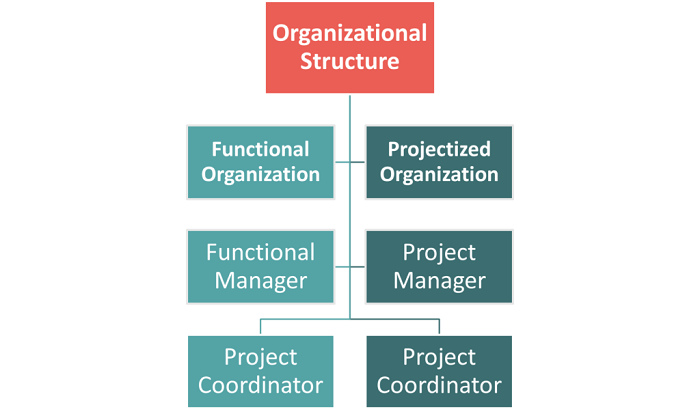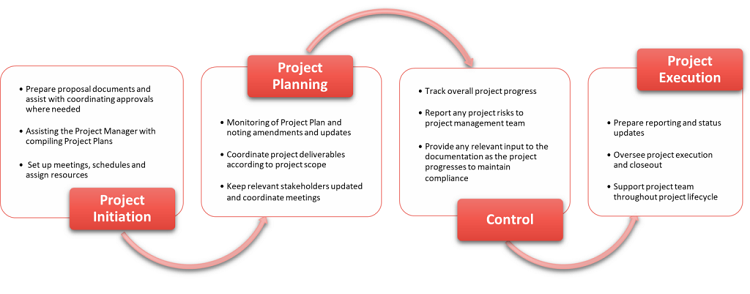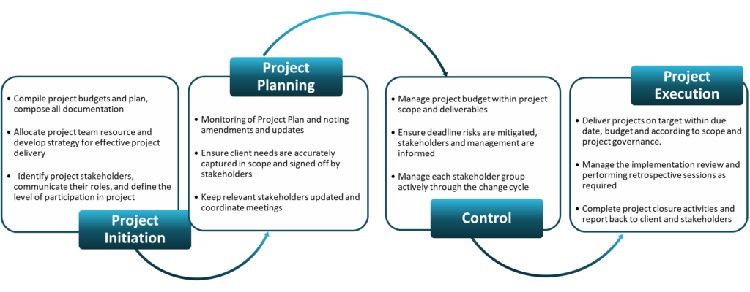As a Senior Project Manager, I’ve been in several different roles throughout my career, and I’m sure, like me, you either (or will) hit a cross-road in your life when you’re suddenly unsure about if you’re where you’re supposed to be.
In addition, Project Management and Project Coordination are sometimes confused by people starting their careers and those you may come to work with within your team.
So let’s compare the two roles and examine the advantages of each, which may help you understand why you’re having difficulty choosing or distinguishing between them.
Additionally, I’ll provide some in-depth information on the essential characteristics and skills required to excel in this industry.
I will also detail the key features and qualities you can hone in on to make for a successful incumbent in each role.
Bottom Line Up Front
Project roles in the world of technology are diverse and exciting. Project Managers are primarily responsible for the entire project from start to finish.
Meanwhile, Project Coordinators are crucial in ensuring the project stays on track and supporting senior resources. Becoming a Project Coordinator and advancing to Project Manager could be the optimal progression.
Main Differences Between a Project Manager and Project Coordinator

The below differences are a comparison for a generic project environment.
I have worked on several projects where, due to the size of the project or organization, the roles are slightly different regarding their tasks. Therefore, it will affect how you work within a team environment, so I will give a high-level overview below for reference.
You might have yet to hear of organizational structure within project management. To simplify this, we will use three different structures for every organization (although there are many more).
Functional Organizational Structure is more commonly used in substantial companies with multiple levels or silos. On the other hand, a Projectized Structure is used in smaller environments, and a Matrix Structure (not pictured here) is a blend of the two.
Ultimately the structure will affect the duties of the Project Coordinator, particularly in the case that there is no Project Manager. Below is a high-level overview of how this structure may be created.
In a Project Coordination role within a Functional Structure, you may fill the role of both Project Manager and Project Coordinator. You would also report to a Functional Manager and not a Project Manager.
You might also be interested in: How to Become a Project Manager
The main differences between Project Management and Project Coordination:
- Project Management is all about big-picture planning and getting a project from start to finish, aiming to hit specific goals along the way, whereas Project Coordination is more about making sure everything runs smoothly in the day-to-day during the project.
- The Project Manager is ultimately responsible if things go awry – they’re on the hook for the success or failure of the whole project, whereas the Project Coordinator keeps tasks and processes running smoothly within the project, but they don’t take the fall if the whole project falls apart.
- Project Management involves making sure the right people and things are in the right place at the right time – a strategic use of resources to make sure the project gets done, whereas Project Coordination is more about scheduling these resources.
- Project Management has to keep the big picture viewpoint and has the power to make big decisions, whereas Project Coordination is more about the nitty-gritty details, making sure tasks get done, everyone’s talking to each other, and providing support to the team.
The Daily Workflow for the Project Coordinator vs Project Manager
At a high level, these roles may look the same; however, upon closer inspection, we can see how they differ based on daily activities.
Below, the typical daily flow of tasks can be assumed for IT Projects where a generic team structure is in place, and a Project Manager and a Project Coordinator are assigned to assist with the project delivery.
Although these tasks are related, you can now see that they carry different obligations depending on who is responsible for each output. You can also see how the Coordination role is supportive in nature, whereas the Project Management role can be seen as more authoritative.


A Breakdown of Some Project Management vs Project Coordination Responsibilities
The Project Schedule
Project Management needs to create an overall project schedule, keeping that bird’s eye view for the entire project. That means managing resources, budget, project goals, stakeholders and setting clear project milestones to keep an eye on overall progress.
Project Coordination needs to focus on adhering the schedule on a day-to-day basis, tracking progress, to make sure the daily and weekly schedules are adhered to.
Project Scope
Project Management details what the project aims to achieve, and sets clear boundaries and scope of the overall project.
Project Coordination communicates any changes to the team that is set by the PM, makes sure to follow up on project scope with team members and informs them on any modifications to Project Scope that they need to know about.
Project Management Software
Project Management uses software is used for strategic planning and tracking overall progress toward milestones.
Project Coordination uses the PM software tools to monitor daily tasks, daily and weekly resource management and to maintain internal communication.
Project Status
Project Management requires a larger, macro perspective on the project status, focusing on how the project is tracking against its overall objectives.
Project Coordination keeps the micro perspective, keeping the pulse on the daily status, informing the team and stakeholders, and identifying any immediate issues.
Project Meetings
In Project Management, leading project meetings is key. These meetings are used to drive strategic direction and resolve high-level issues.
In Project Coordination, the focus is on facilitating these meetings, ensuring everyone is prepared, and that action items are followed up on.
Deliverables
Defining and overseeing the quality of project deliverables falls under Project Management, ensuring the output aligns with the project objectives. The PM is the overall project leader for all deliverables, but ultimately they get the project coordinator to help with the daily implementation of the project deliverables.
Project Coordination plays a supportive role, tracking these deliverables, keeping everyone informed, and ensuring that the components of the project align for delivery. The Project Coordinator is more responsible for the administrative tasks that come with the project and is not responsible for project success.
Coordination of Responsibilities
In Project Management, the focus is on making strategic decisions and problem-solving, while Project Coordination facilitates communication and the flow of information, which is integral for maintaining the overall project’s health and momentum.
Key Features of a (Great) Project Manager
As a Senior Project Manager, I constantly strive to refine how I deliver projects and work with teams and all aspects of my job. By measuring oneself against what you have believed to be critical success skills, it becomes easier to find ways to improve.
For example, successful Project Managers are natural leaders (or have worked hard to become natural at leading) and use their interpersonal skills to enhance their relationships with teams.
This is not an essential characteristic, but it must be considered. I work with an average of five to six internal Project Managers and up to one to fifteen Project Managers (or more) daily, depending on how many client projects I am consulting on during a typical day.
Many individuals have similar qualifications and experience, and I can ALWAYS see a vast difference in the success of a project based on how dedicated and passionate the Project Manager is. Your ability to excel and deliver a solution to the highest quality possible will translate to your team and clients.
Here is a quick list of critical skills of a Project Manager:
- Ability to collaborate with team members of all sizes and dynamics
Effective communication skills are so critical you may possess all the hard skills (like technology expertise). Still, you will only be able to deliver a great solution with the cooperation of your team members. The team should have clear directives and documentation to execute their functions effectively. - My proactive and solution-driven approach ensures that challenging situations are met with alternative ideas that lead to favorable outcomes. Although it is tough to prioritize skills, paying meticulous attention to detail and managing schedules significantly improves the rollout of projects.
- Financial acumen is vital as a Project Manager will deal with budgets, forecasting, and estimates daily.
Pros and Cons of Project Management
This list will look slightly different for everyone, I love my job and the teams I work with, so there are fewer cons. However, every job has downsides, and I will apply some generic trends to the list below.
These are my Pros and Cons:
Pros
- Diversity! Project Management changes every single day. Exposure to different projects, products, tools, technologies, and multiple teams exists. Project Management is all about being able to navigate these different areas in the business.
- Opens you up to more opportunities. There is an excellent trajectory into so many different roles should you get bored, and I’ve personally seen several of my colleagues transition into some fascinating roles. Project consulting, solution architecture, program management, business analysis, delivery management, and even a CIO or COO role.
- Impact: Project Management is all about seeing a project go from concept to reality and that has a big impact on a business or industry. As a PM, you get to make the big things happen that have a real impact and that’s super rewarding.
- PMs expand their reach: Working in project management gives you a chance to interact with various departments, clients, and external stakeholders. Project management touches many parts of the business, which expands the PM’s professional network.
Cons
- On the flip side of the diverse nature of this field, some people may not enjoy the ever-changing pace of a role in Project Management and may opt for something more stable.
- A fair amount of documentation is involved in project management, especially if you need a dedicated resource for this purpose. Sometimes, you or your client may not have access to a Business Analyst. Therefore, your role might incorporate being responsible for putting together all of the documentation for a project.
- Deadlines can become stressful when project issues and delays are experienced. You can sometimes become the “punching bag” for your client as you are often the most client-facing role in the team.
Key Features (of a Successful) Project Coordinator

As with project management, project coordination is a multi-skilled job that can change daily. Yes, there are lists of generic features of success in this role. However, certain qualities set you above the rest when the playing field is level.
Here is a quick list of critical skills of a Project Coordinator:
- You MUST be able to multi-task efficiently, and I found that the best project coordinators I’ve worked with are those that can context change easily and keep on track regardless of the plethora of tasks thrown at them.
- The ability to prioritize and manage a schedule and GREAT attention to detail are critical in the role.
- Another valuable trait I’ve noticed in great coordinators is the ability to deal with pressure and be a little “thick-skinned,” as you may be reporting several senior managers asking you for different things. But, again, the calm and collected coordinators have always outshined their more easily flustered counterparts in these situations.
- A project coordinator that can take the pressure off the project manager and help formulate solutions in a stressful situation will always be considered solution-driven and helpful.
Pros and Cons of Project Coordination
Pros
- There’s a ton of variety: The field of Project Coordination is always changing and is a great field to get into for someone that wants to run the day-to-day tasks of a project. Project Coordination is about understanding how to juggle these different elements seamlessly while working with a more seasoned Project Manager.
- A great foundational field to grow: Learning the field of Project Coordination can propel someone into various roles such as project consulting, solution architecture, program management, and business analysis as well as becoming a Project Manager.
- Project Coordination has an impact as well: While someone in Project Coordination might not call all the shots, they do get to be right in the trenches, making things happen to help the project move forward.
Cons
- Sometimes, the Project Coordination role might be pretty administrative and involve many duties, such as ordering stationery or office supplies. This can be something that some individuals might not enjoy doing long-term.
- As mentioned above, if the roles between a Project Manager and Coordinator are not clearly defined, there may be a clash of responsibilities and expectations.
- The role isn’t as high-paying as a Project Management role, and in some instances, you may be doing similar tasks daily, especially if you find yourself in a smaller company.
- In certain situations, you may have to answer questions requiring more advanced technical expertise, which can be nerve-wracking.
Other Alternatives to Consider

Now that we understand the differences between these roles let’s explore other options. When deciding between the two functions, I considered average salary, career path, and potential for growth and demand.
Most Project Managers are keen to pursue project-management-related qualifications depending on their preferred methodology. Most of my colleagues (including myself) have completed either a Bachelor’s Degree and a combination of one or more of the below certifications:
- PMP (Project Management Professional)
- CAPM (Certified Associate in Project Management)
- PMI Agile Certified Practitioner (PMI-ACP) Certification
- PRINCE2 Foundation and PRINCE2 Practitioner Certification or RINCE2 Agile Foundation and PRINCE2 Agile Practitioner Certification
- SAFe (Scaled Agile Framework) certifications (there are multiple offered depending on the chosen application)
Most Project Coordinator roles don’t typically require a bachelor’s degree, and you can most likely find a position with only a high school diploma.
The coordinators I’ve worked with who have pursued a PMP, CAPM, or similar (see above list) are generally sought after as they show more skill and interest in project management.
Our discussion on these roles has focused on their relevance within Information Technology. However, the types of skills acquired in these positions can be transferable to various industries.
Therefore, if you decide to transition to a different field, you may find it easy to do so. Below are just some project-based industries where you could leverage your skill set:
- Construction
- Healthcare & Pharmaceuticals
- Medical
- Finance and banking sectors
- Engineering
- Legal
Project Management vs. Project Coordinator Salaries and Demand

As with most management and IT-related careers, the demand increased yearly.
I’ve found that these roles are typically the hardest to fill in my organization due to the type of dynamic person it requires to be truly successful. As such, it also means that the more skilled individuals are in higher demand and can ask for higher salaries.
- According to the most recent Indeed and Glassdoor salary scale reviews, a Junior IT Project Manager in the United States can earn between $64,229 – $72,481 annually. For a mid-level IT Project Manager, that range increases to around $97,757 – $102,839 annually.
- A Junior Project Coordinator can look at a starting salary of around $59,600, whereas a Senior Project Coordinator can earn up to approximately $87,814 annually.
Remember that with every qualification you gain, your salary potentially increases. According to Forbes – In the U.S., PMPs make 20% – 32% more than non-certified project management specialists.
Project Coordination and Project Management FAQs
Answer: No, the Project Coordinator focuses more on scheduling, managing diaries, and coordinating resources to help the project stay on track.
On the other hand, a project administrator is more focused on the administration, including filing, documentation, setting up meetings, and taking minutes to put together reports.
Answer: Yes, while most employers prefer some type of qualification or formal background in a similar role, it’s not essential. Project Coordination is an excellent career for those just starting. However, Project Management might be more challenging in finding a position without any experience or qualifications.
Answer: There are hundreds of interview tips online, but you can say a few things in the interview to show the team that you are a great candidate (even if you don’t have the expertise or qualifications).
In my hiring process for junior project roles, I find that often soft-skills are harder to recruit for as they’re not generally something that can be taught.
Being on time and well-prepared (research the company and role thoroughly) can show your skills would be transferable in the coordination or management space. Show your willingness to support and learn from your reporting manager.
Conclusion
Comparing the areas of Project Management and Project Coordinator can be confusing as there are many ways the duties of each of these roles overlap. I’ve often seen the confusion that happens in deciding who does what and when as I’ve managed my own projects, but there are some key differences in these areas of project management.
Project coordination is an excellent starting point for a successful career and gives you the space to develop your skills and qualifications over time. Project coordination is about keeping the day-to-day things in the project humming along nicely.
Project Management, on the other hand, takes the reign and is ultimately responsible for the big picture of a project, working with a variety of stakeholders and making sure deadlines are met.
You might also enjoy:
- Functional Manager vs Project Manager: Roles Compared
- Types of Project Management Roles Grouped by Experience & Industry
- Types of Project Management Frameworks: Top 20 Popular Methods to Consider for Your Business
Sources

Tarryn Menzies is a seasoned Senior Project Manager, Agile enthusiast, and the insightful voice behind her expert pieces on Projects Pivot. With a career rooted in hybrid Agile environments, including Scrum, Kanban, and MoSCoW methodologies, her passion for project management is palpable in every article she authors. A certified AgilePM via APMG, Tarryn is well-equipped to delve into the intricacies of project management, leading readers through complex concepts with ease and clarity.
In her current role as an IT Operations & Project Manager, Tarryn consistently achieves a balance of technical proficiency and strategic thinking, making her uniquely suited to interpret the often-intertwined worlds of IT and project management. Her extensive skillset includes Waterfall Project Management, PRINCE2, and Service Delivery, among other things, demonstrating her versatility as a management professional.
Known for her clear communication and problem-solving abilities, Tarryn has a knack for managing stakeholders effectively, steering complex projects towards successful completion. With proficiency in Project Management Software, Jira, and XML, she navigates the digital landscape of project management with ease. Moreover, her familiarity with SaaS and Business Analysis empowers her to engage with the evolving needs of modern project management and she shares all her real-world insights here at Projects Pivot!

